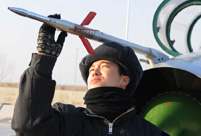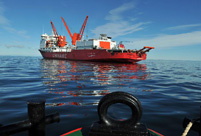 Int'l Snow Sculpture Art Expo in Harbin
Int'l Snow Sculpture Art Expo in Harbin Sichuan money wall for dividend payment
Sichuan money wall for dividend payment Li Na crashes Belinda Bencic in 2nd round at Australian Open
Li Na crashes Belinda Bencic in 2nd round at Australian Open
 Shocking moments when PLA's weapons open fire
Shocking moments when PLA's weapons open fire Famous Lanzhou beef noodles
Famous Lanzhou beef noodles Armed Police hold anti-terrorism drill in SE China's Xiamen
Armed Police hold anti-terrorism drill in SE China's Xiamen Harbin Int'l Ice and Snow Festival opens
Harbin Int'l Ice and Snow Festival opens 'Jin' named the word of the year by cross-strait netizens
'Jin' named the word of the year by cross-strait netizens Chinese scientific expedition goes to build new Antarctica station
Chinese scientific expedition goes to build new Antarctica station
NANNING, Jan. 20 -- In a mountainous, woody part of south China, people are talking about the same problem facing the Chinese capital thousands of miles away -- smog.
Unlike pollution-dogged Beijing, smog is new to Guangxi Zhuang Autonomous Region, which has long boasted a good natural environment. After several bouts of hazy weather gripped the region last year, alarmed locals brought the issue to this year's "two sessions."
At the annual session of the region's political consultative conference, which is being held along with the legislative meeting, haze has been a heated topic.
"Nanning (capital of Guangxi) used to be famous for its clean air, but after looking at the city's air quality readings last year, it's hard to be optimistic," said Jiang Hongbing, vice head of the provincial supervision department and a political advisor.
The region reported 92 days of air pollution last year, and even as Jiang proposed greater government efforts to clean up air on Friday, the city of Nanning was shrouded in dense smog that shot up the pollution level to "serious."
Jiang said worsening air quality had increasingly affected the livelihood of locals, and the government "should act before things get really serious."
There were similar discussions at the ongoing political consultative conference of central China's Hubei Province, which has seen four proposals on smog control, compared with only one in 2013.
Smog is a chronic problem in Hubei, where each winter has recorded more than 12 smoggy days since 2004, but the situation got worse last year, according to political advisor Li Hong. Hubei's capital city of Wuhan, for instance, recorded 156 days of air pollution last year.
"(People in Hubei) feel the problems of Beijing and Shanghai are now happening around us," said Li, who is the vice head of the provincial supervision department.
The serious situation has even sent smog into Hubei's government report for the first time. Delivered at the legislative conference, the report called for "high attention" on urban smog and for enhancing pollution control and monitoring measures.
Air pollution is a perennial headache in China, with its industrialized Yangtze and Zhujiang river deltas and the area around Beijing being the hardest hit. But after a hazy 2013, alarm bells are ringing in areas where air pollution was previously moderate.
Neither Guangxi nor Hubei is in the traditional "smog belt," and in 2013, several provinces and cities known for their good air quality also reported unusual outbreaks of smog, including the southeastern province of Fujian and Lhasa City in southwest China's Tibet Autonomous Region.
Apart from unfavorable weather patterns, experts have blamed unchecked industrial pollution and the side effects of rapid urbanization for the appearance of smog in more Chinese areas.
In the case of Guangxi, the increased discharge of industrial emissions, dust from construction sites and vehicle exhaust are identified as factors behind the deteriorating air quality, said Yu Zebin, an environmental expert at Guangxi University.
"The city of Nanning, for instance, is busy building its subway system and urban facilities, so construction sites are everywhere in the city. Meanwhile, huge and rapidly growing car ownership is also causing more exhaust to be emitted into the air," Yu said.
Political advisors and analysts in Guangxi and Hubei have proposed measures ranging from tightened controls on industrial polluters to promoting public transportation.
Regional cooperation was also highlighted in a proposal by the Hubei commission of the China Democratic League, which urged for joint efforts by all cities in the smog-hit area.
Yet Li Hong said she did not expect the problem to be solved in a short time.
"Tackling smog requires a systematic approach that involves economic restructuring and industrial upgrading. We should prepare for a long battle," Li said.
 Su-30 fighter formation taking off for training
Su-30 fighter formation taking off for training  Xuelong carries on mission after breaking from floes
Xuelong carries on mission after breaking from floes Charity exhibition raises money for panda protection
Charity exhibition raises money for panda protection 'Map of China' on the stone
'Map of China' on the stone  Chinese naval escort taskforce repels 4 suspicious vessels
Chinese naval escort taskforce repels 4 suspicious vessels World's weekly photos (1.6-1.12)
World's weekly photos (1.6-1.12) Li Na crashes Belinda Bencic in 2nd round at Australian Open
Li Na crashes Belinda Bencic in 2nd round at Australian Open Weekly sports photos
Weekly sports photos China's national pole dancing to play 'The Butterfly Love'
China's national pole dancing to play 'The Butterfly Love'  The never-ending Silk Road
The never-ending Silk Road  Spring Festival travel rush: One window, one world
Spring Festival travel rush: One window, one world Int'l Snow Sculpture Art Expo in Harbin
Int'l Snow Sculpture Art Expo in Harbin China photographs internal structure of water molecule
China photographs internal structure of water molecule 'Predator' makes proposal to girlfriend
'Predator' makes proposal to girlfriend Thousands of fish frozen on Norway sea
Thousands of fish frozen on Norway seaDay|Week|Month